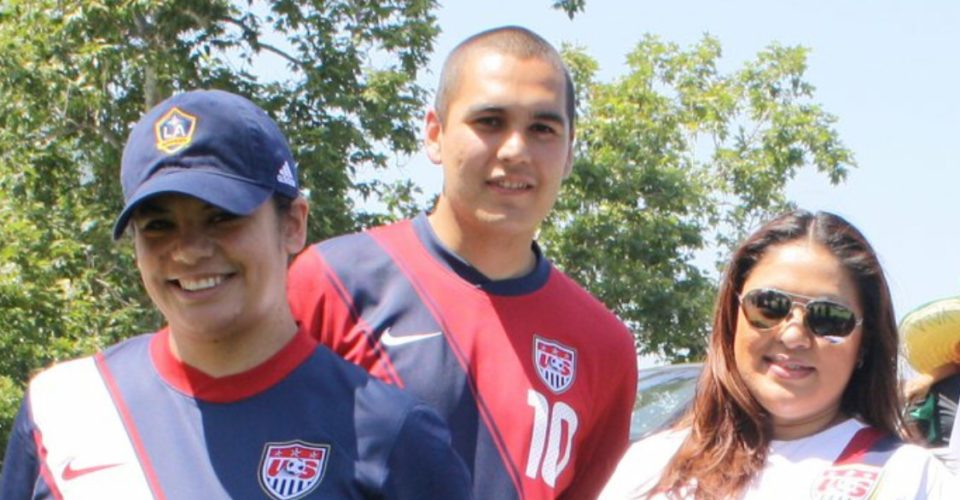“I remember this game like it was yesterday,” said Andres Diaz, 31, a Communities in Schools Site Director, “I was in Mexico City at the time of the game and was watching it surrounded by my family who were all rooting for Mexico. I was the only one in the house hoping the United States would win and had brought with me a little flag to wave around.”
By JOSÉ OCAMPO
EL NUEVO SOL
“My parents would always tell me that because I was born here in the United States that I should root for my home country,” said Oscar Tejeda, former president of the California State University Northridge chapter of Hermanos Unidos, “but I always answered them back ‘I am just rooting for the team you guys do.’”
For many Mexican-American soccer fans picking a national team to root for comes with a lot more baggage than most other choices between two other nations.
One of the reasons behind this is because ever since 1991, when the United States Men’s National Team (USMNT) shocked Mexico in the inaugural North American soccer tournament called the Gold Cup, the U.S.-Mexico rivalry has been the one of the more intense games in the world.
Before the Gold Cup was established, Mexico had a stranglehold on the whole CONCACAF region, which includes North America, Central America and the Caribbean nations. Mexican games against the U.S. where an afterthought and a place where both federations could make more money by holding those games in the Los Angeles Memorial Coliseum where Mexican Americans would show up and fill up the 90,000-seat venue. Mexico ended up beating the U.S. 23 of the 27 games they played from 1937-1990 and only losing one of those games.
“While I was growing up, the United States never were that good so it was never a hard choice to make,” said Benjamin Luevano, a trucker who immigrated to the United States in 1993 when he was 19. “However, recently with the rivalry being more leveled, I can’t say it would be that easy of a choice for me.”
During the following years after 1991 the rivalry started to form the way we see it now. It was a more back and forth affair in which the result depended on where the game was being played. Mexico continued its dominance in its home stadium, “El Azteca”.
However, the U.S. found its own dominant home stadium where they would play all their games against Mexico, Mapfre Stadium in Columbus, Ohio. The U.S. has ended up winning more games after 1991 than Mexico, winning 17 games and losing 12.
The most important result being a 2-0 win during the 2002 World Cup in Jeonju, South Korea.
“I remember this game like it was yesterday,” said Andres Diaz, 31, a Communities in Schools Site Director, “I was in Mexico City at the time of the game and was watching it surrounded by my family who were all rooting for Mexico. I was the only one in the house hoping the United States would win and had brought with me a little flag to wave around.”
“I always felt proud of my Mexican culture but I do identify as an American,” said Diaz, “this could be because since a very early age soccer has been a big part of my family and I have always rooted for the United States.”
Since then a lot of the drama surrounding this rivalry has been because of more things outside of the field. With the current climate with President Trump’s policies on Mexican immigration and his border wall this has put a strain on the relationship between the two nations it has caused a different atmosphere during games played between these two.
“Well, at the moment, I do not feel like I am too welcomed in this country,” said Tejeda, “I always felt proud to be a Mexican American and felt it was important to be proud of my past culture and combine the two.”
“Most people feel that because I am a Mexican fan then that means I am anti United States,” continued Tejada, “I just grew up watching them play and saw my parents root for them and wanted to be like them.”
However, some people believe by rooting for Mexico is rejecting your American life. After a game in the Rose Bowl at Pasadena, California in 2011 in which the Star-Spangled Banner was drowned out by boos by the Mexican fans, Alexi Lalas, a former star for the U.S. during the 1990s had harsh words for Mexican Americans.
“I’m all for roots and understanding where you come from and having respect for your homeland,” Lalas told the press. “But tomorrow morning all those people are going to get up and work in the United States and live in the United States and have all the benefits of living in the United States.”
Diaz does not agree with this form of thinking and believes it adds a further strain to the possibility of new fans coming in.
“A lot of those fans just followed their family and feel it helps them get closer to their families’ culture,” said Diaz, “it is just a game and some people put too much value in what team people chose.”
Tags: Jose Ocampo Mexican Americans Mexican team soccer US team











